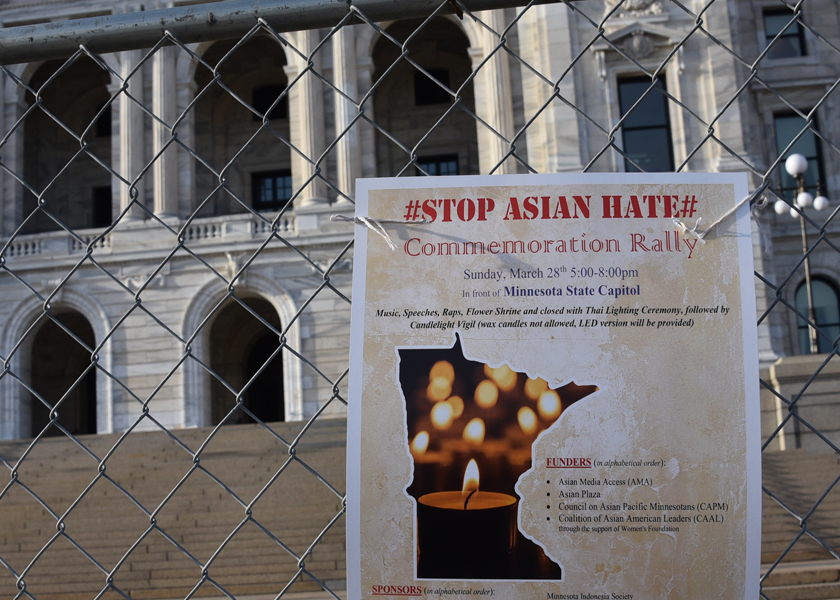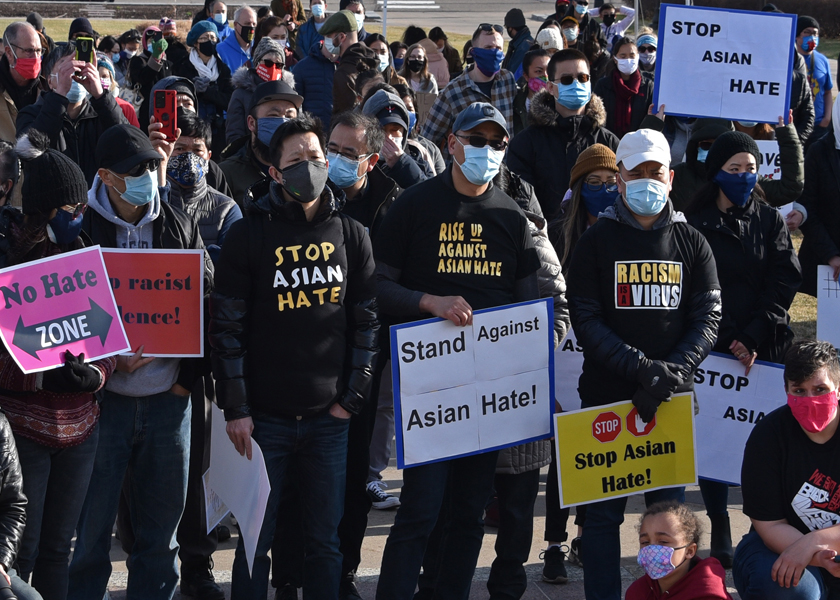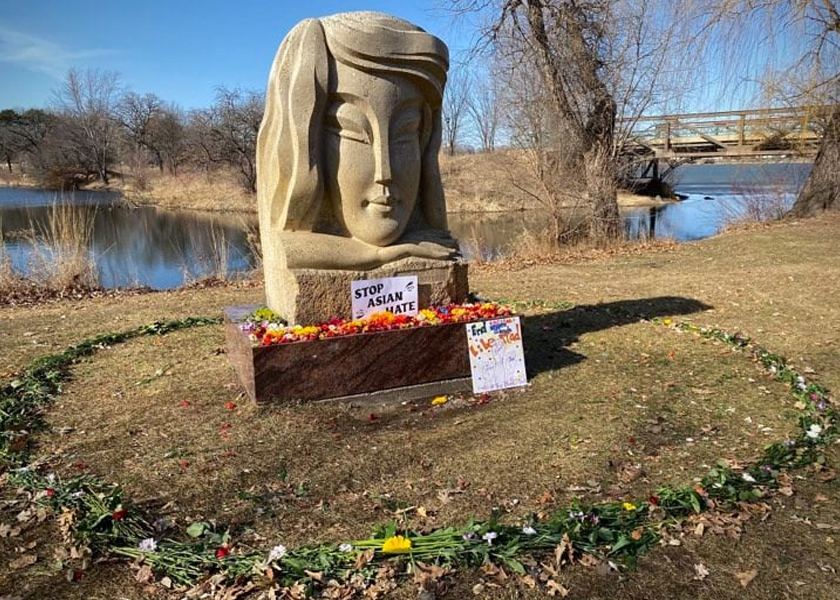Editor’s Note: Eyewitnesses to flagrant racism, Twin Citians also experience the healing of solidarity | Editor’s Note by Martha Vickery (Spring 2021 issue)

Are we finally getting to a unified theory of everything?
I’m not talking about the kind that Albert Einstein invented with his theory of relativity, although that idea is often called “the theory of everything.” I’m not a science-y person, but even I was fascinated and more or less geeked out by a recent TV documentary relating Einstein’s hypotheses to discoveries about the universe just coming to light in recent years. For example, scientists can now observe that the behavior of dark matter (black holes) is consistent with Einstein’s theory, even though he could not make such measurements during his lifetime.
Einstein did not need to know about dark matter or other recently discovered behaviors of space to come up with the theory. He didn’t need to see it with his own eyes. He just needed to be convinced that no other theory worked. Whether he applied the idea to the behavior of planets being born, or to apples falling from a tree, it worked the same. He was a thinker ahead of his time, in that very few understood the idea at the outset, but as the future unfolded, his ideas have been proven right again and again.
These days, I am thinking more about a unified theory of social justice and public health, and we may as well throw in economic justice along with it. None are happening in their own spheres. They are all parts of one big theory. We have seen it right here in our own neighborhoods.
Emotionally, it has been a raw last couple months for many of us. In a normal year, we go from day to day believing that we will get home tonight, that we will not be killed by a cop during a traffic stop or other minor infraction of the law. We assume that our children, especially adult Asian American children, are reasonably safe while interacting with the world. However, trauma after trauma has been visited upon our communities, particularly African Americans and Asian Americans over the past year. Police violence has ended so many lives before their time.
The ongoing Derek Chauvin trial was certainly at the back of our minds for many weeks, particularly those of us in the Twin Cities. We heard and saw it every day. Then, there was the Atlanta mass murder, and then the police shooting death of Daunte Wright in Brooklyn Center. Stress, shock, grief and disbelief came in daily doses.
Like many others, I went months, particularly more recent weeks, dealing with a low-level anxiety, from no particular source. The world is suddenly a treacherous place for my loved ones. But if it is such a world, then how should we live?

Attending a couple of demonstrations where people gave voice to the grief and uncertainty, and called for calm and positive action, was helpful. Standing in the wind with perhaps 500 others at the Capitol rally March 28, I heard the thoughts of some of Minnesota’s best leaders on racial justice. One invoked Martin Luther King Jr.’s famous quotation “Racism anywhere threatens freedom everywhere.”
I considered the layered meanings of this short statement, and whether that sums up the unified theory I have been seeing play out. Like Einstein, King did not need to imagine America’s long struggle with becoming a fair and just country stretching more than 50 years into the future after his death. He didn’t have to be in Minneapolis in 2021 to know the situation here. He knew his theory would always be true.
Just as racism anywhere threatens freedom everywhere, the same is true of the pandemic — a deadly infectious virus anywhere also threatens freedom everywhere. It was Italy, then New York, and now it’s India’s disaster of overwhelming COVID cases right now that is a potential disaster for all.
Asian Americans have been facing these double plagues — racism and pandemic — in the last almost 18 months. But, as our columnists and some of the best thinkers on race who spoke at recent events told us, we can’t give up now.
In the Twin Cities, we can plainly see all around us what King knew in his heart. If it is not a theory of everything, it is a theory of almost everything. We can’t escape from the coronavirus because it comes after all of us. We need to beat it back with collective action, working on simple and boring public health measures, and getting the vaccine.
In the same way, we cannot dismiss racial justice after this moment of awakening has faded away. It’s imperative that we work on it every day. What kind of police do we want working for us? What will we allow them to do? What kind of outcomes of trials like Derek Chauvin’s do we want to see in the future? How do we want hate crimes to be addressed in our state? (see story, p. 52, in the print edition)
Of necessity, these issues took center stage in the Twin Cities this spring. And although they may eventually fade from the headlines, they should not fade from our consciousness.
I was immensely impressed that Sarah Han, longtime KQ volunteer, and her partner Kat Porter, took the time to write a joint essay about their night in the Hennepin County lock-up, after being cornered and arrested along with a crowd of others while protesting in front of the Brooklyn Center Police Department. Their instinct to act for racial justice ended with an infuriating, boring and terrifying night, and getting hit up with some big fines the next day. Exhausted, with hurt wrists from being zip-tied so tightly, Sarah got up the day after her incarceration to prepare a program on racial justice for her students. After that, the two produced a joint essay.
Thanks both of you for your example, and for posing some important questions about why we march and how we want police, who supposedly work for us, to act toward those exercising their constitutional rights to peacefully protest. There is a lot to think about in this spare story.
I am also grateful for Mae Ouhr who wrote about her trip to Atlanta after the murders happened, and how connection with other Korean Americans there sparked some healing thoughts that she brought home to Minnesota and wrote about for us. If the Atlantans can hope for a better future, we can too.

After eight people, four of whom were Korean American women, were gunned down in Atlanta, Asian Minnesotans felt it at a gut level, hitting the streets and parks to mourn and be outraged together (see photo essay, p. 55, print edition). At the memorial demonstration at Lake Phalen in St. Paul, right after the murders, there was an outpouring of love and solidarity in the midst of all the grief. At the end of the event, participants symbolically tossed flowers into the water. The colorful petals floated on the still surface on that gray spring day, like little sparks of hope.
The New York Times recently reported that we may not reach the holy grail of “herd immunity.” Basically, we Americans, as a group, are too stupid and selfish to exercise the kind of respect for others and self-control needed to achieve it. (The Times didn’t exactly say that. It is my own summary). That story also said the pandemic will soon slide into an “endemic,” where pockets of the disease will still exist, but be contained due to the vaccinated population, but not quite enough to wipe out the disease. It is a depressing thought.
I listened to Gov. Tim Walz’ latest COVID update today, feeling like I was in a school assembly while the principal gives a pep talk (a role he had in a past life). Like I used to do during school assemblies, I started nodding off. It’s so relaxing to hear a reassuring voice of authority for a change — somebody who seems to have a handle on the problem. He and Commissioner of Health Jan Malcolm both have the rare talent of making something really scary and dangerous sound totally boring.
I guess we’re headed for endemic times now, where we just settle for a partial solution — Walz says when 70 percent of Minnesotans are vaccinated, we’re good. Apparently, we’re all supposed to go back to work and spend money at the malls or whatever.
Not so with racism. In these two issues, the unified theory comes apart a bit. There’s no vaccine for racism. We can’t accept the endemic state. Pockets of racism put all of us in danger too. We are seeing that in the Twin Cities. It’s a threat to freedom everywhere.
Gov. Walz ended with “Go out and have a great summer!” That, at least, I can agree with.


